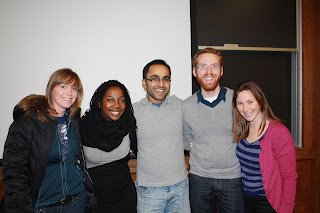The Business and Trade committees focused
on business and trade’s impact on inequality. Colombia has the second highest
level of income inequality in Latin America with a Gini Coefficient of 0.587 in
2009. Business and trade serve as a way to decrease the income inequality by
providing more opportunities for Colombian citizens. Colombia is currently
working on several policies to reduce income inequality including increasing
financial access for households and enterprises, redistributing royalties, and
worker protection.
The informal economy in Colombia
employs 52.2% of the nation. Standardizing the informal economy will allow for
ease in doing business, equitable social security benefit distribution, and the
ability to monitor labor abuses. The standardization of the informal economy
can also lead to the creation of small and medium enterprises (SME).
One great benefit for becoming a
SME is the ability to apply for microfinance loans. In 2009, over US$300
billion was loaned to small businesses. A majority of these businesses would
not be able to secure a loan at a traditional bank due to a lack of collateral.
Microfinance steps into the gap to transition citizens from the informal economy
to SMEs and to lessen the gap between rich and poor by offering more people the
opportunity to start enterprises. Finally, microfinance has led to a reduction in
coca farming in rural areas.
Trade also has a large impact on
the Colombian economy. The US-Colombia Free Trade Act (FTA) was signed in
November 2006 and ratified by the US Congress in October 2011. This act serves
to continue trade preferences established under the 1991 Andean Trade Promotion
and Drug Eradication Act. The FTA will
allow over 80% of U.S. exports of consumer and industrial products to Colombia
to enter duty free. It also focuses on environmental protection and the
protection of Colombian labor rights.
Business and trade policy has
impacted inequality in various ways. Two examples of these influences can be
found in oil royalties and in the floriculture industry. The oil and mining
industries use fees and taxes (known as royalties) to promote social, regional
and intergenerational equality. This distribution is based upon population,
poverty, efficiency and inequality indexes. Due to prior corruption and
mismanagement of funds, in 2010, approximately 80% of royalty’s revenues from
the oil and coal sectors went to only nine of the country’s 32 departments. The
Santos government has combatted this corruption by creating a General Royalties
System (GRS) to ensure equitable division of goods. This step will ensure that
poorer regions of the nation have more capital to combat inequality.
Another example of inequality due
to business and trade can be found in the floriculture industry. Colombia is
the second largest exporter of cut flowers after the Netherlands. In 2006,
Colombia exported a total of 223.2 million kg of cut flowers valued at $960.5
million. This was approximately 4.24% of Columbia’s total exports, making cut
flowers its fourth largest export. The cut-flower industry is the largest
employer of women in the Bogotá region and in 2005 the industry provided
111,000 direct jobs through farming and 94,000 auxiliary jobs through transportation.
In order to meet this large demand for flowers, workers are required to work
long hours and are oftentimes exposed to unsafe working conditions.
A study done by the Colombian
National Institute of Health in 1990 found that flower workers had a higher
rate of miscarriage, premature birth and babies born with congenital effects.
Workers also face low pay and repetitive stress industries. To combat these
dismal circumstances, many have begun to organize unions including UntraFlores.
UntraFlores is a collection of unions that fight for recognition, good
contracts and a right to safety. Policy suggestions for the future include the
provision of safety gear, maternity leave for pregnant workers and national
safety standards for the flower industry.
Our presentation was also
strengthened by Alejandro Ossa from Proexport, an organization that is designed
to attract Foreign Direct Investment in Colombia. During
his address, Mr. Ossa discussed the many gains of the Colombian economy and the
future gains to be made in health tourism, chocolate production, shrimp farming
and cosmetics, amongst other fields.


No comments:
Post a Comment